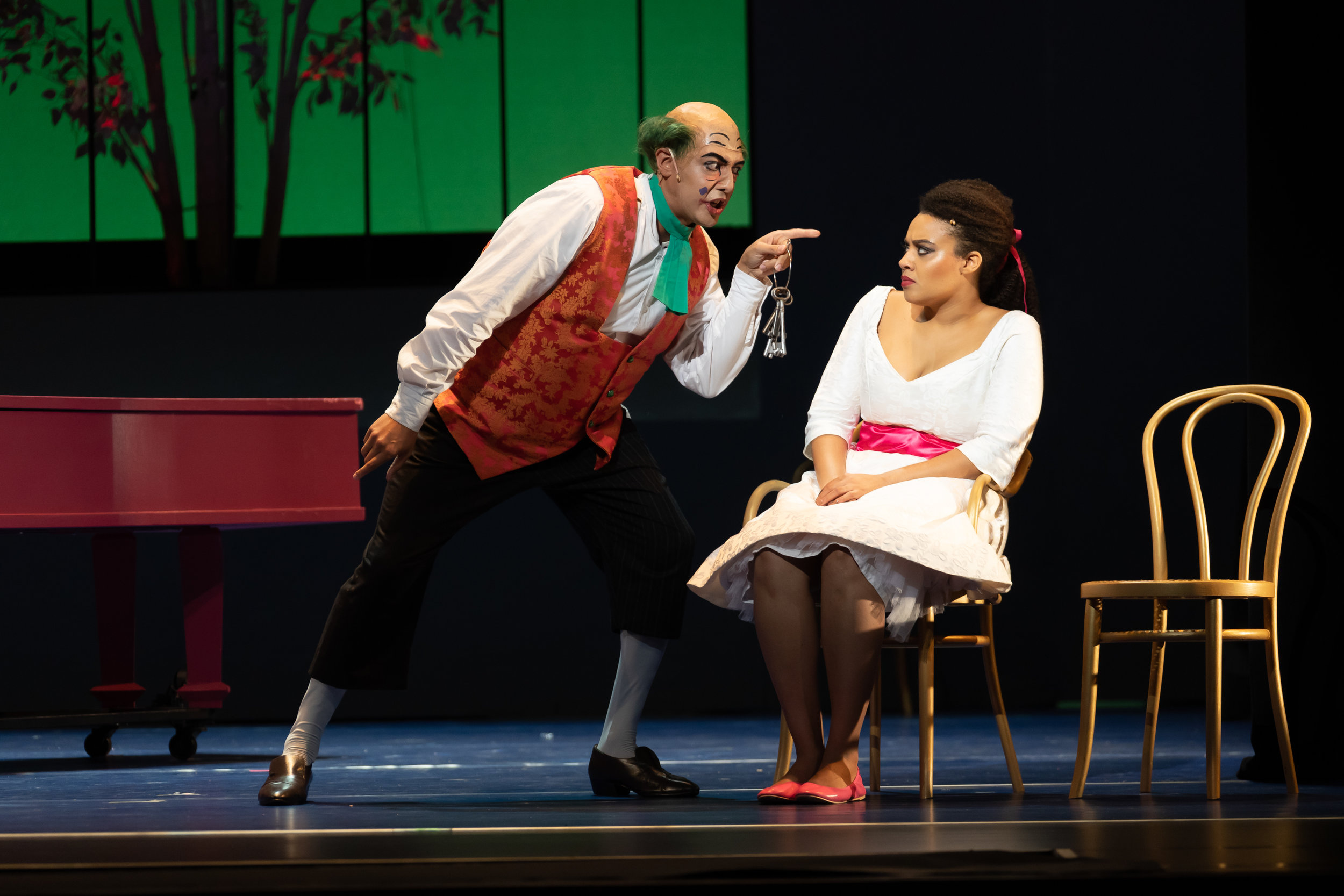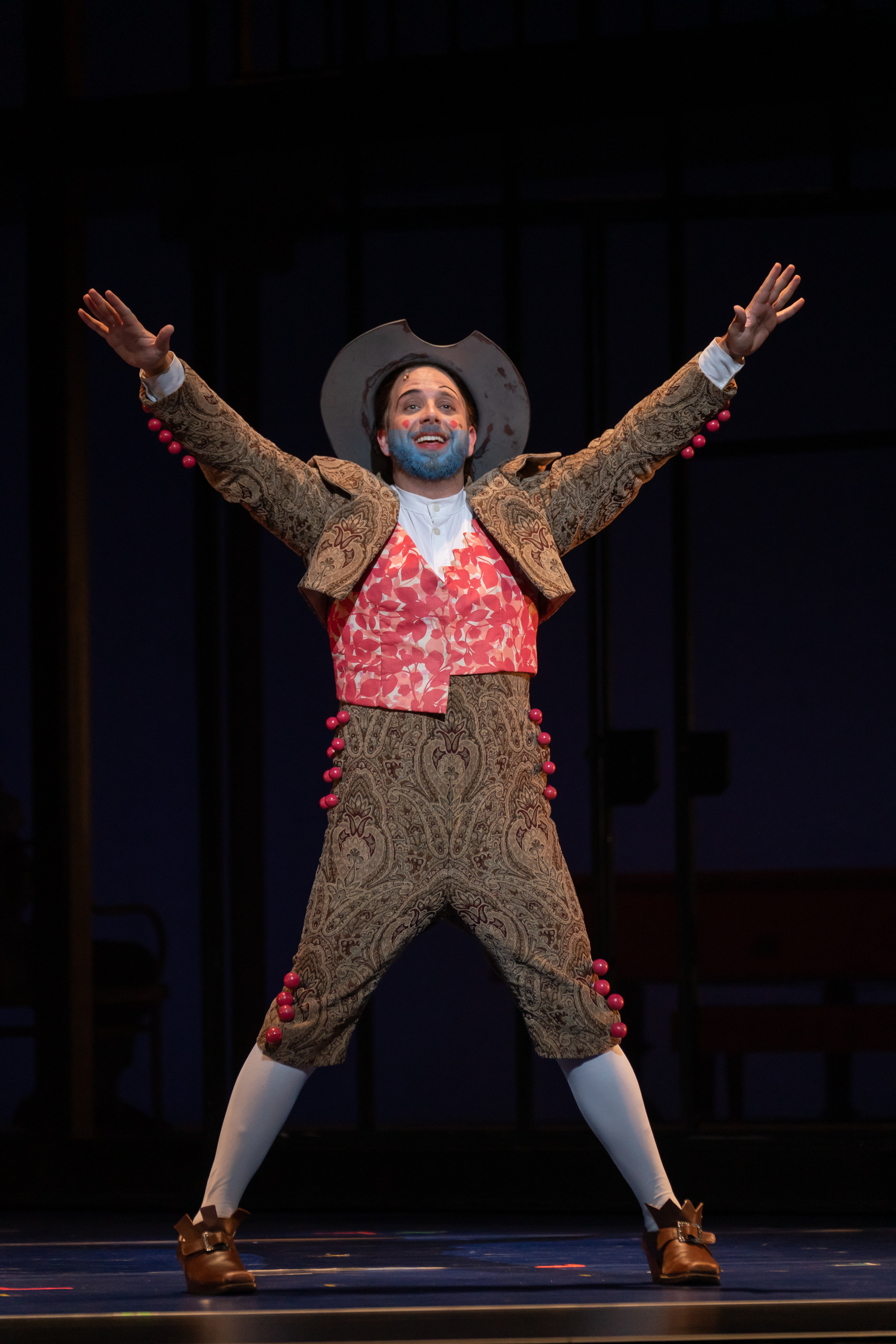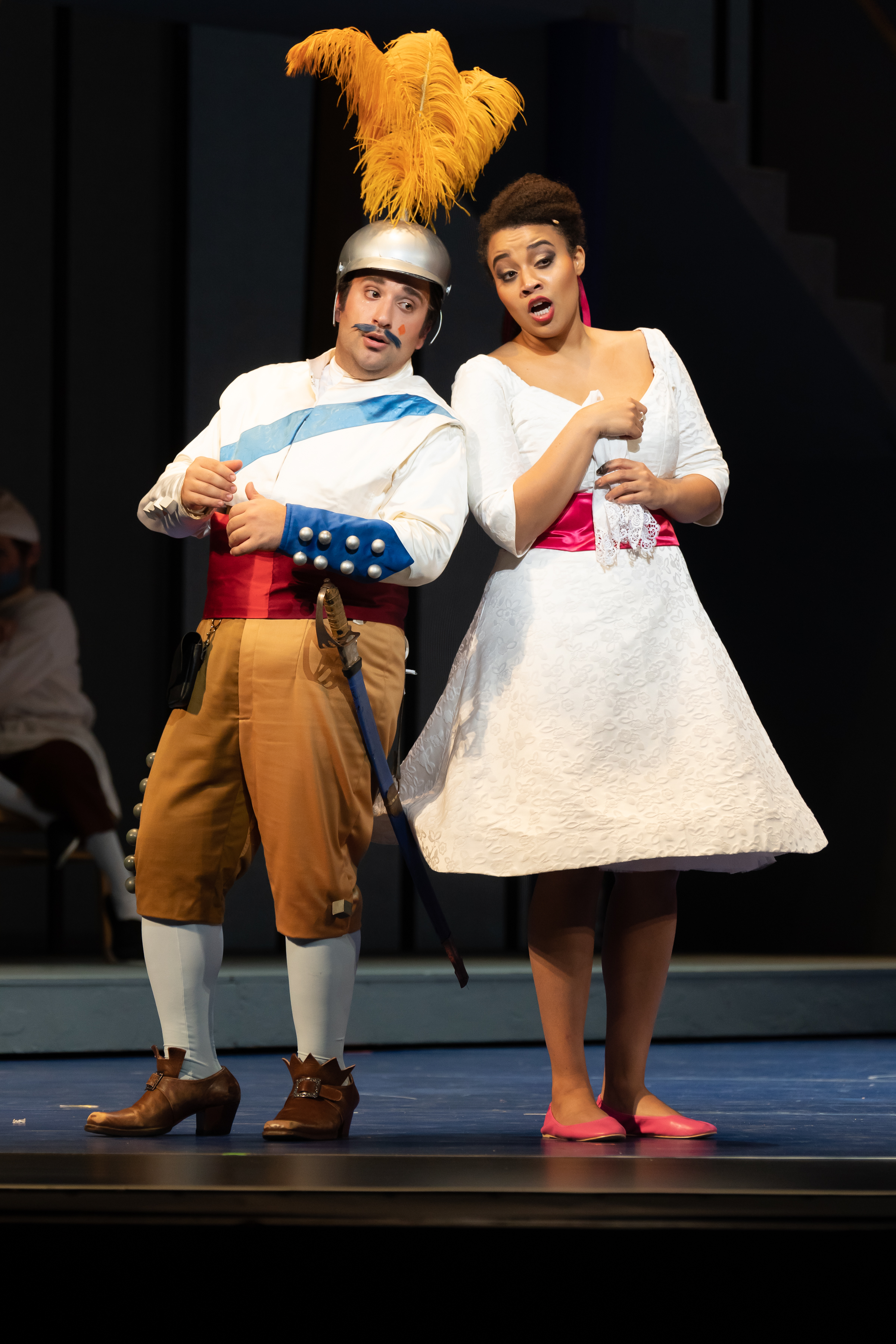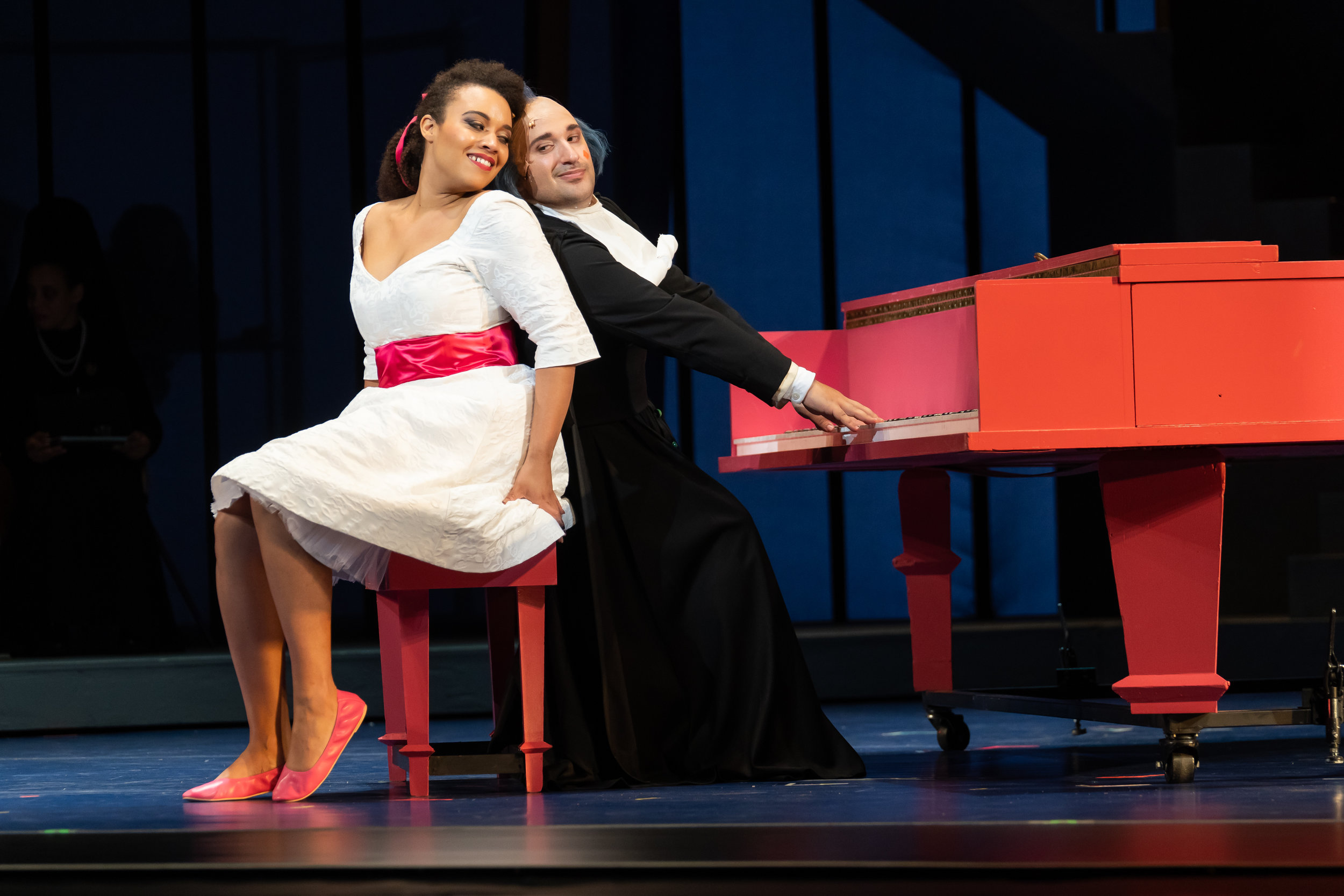On a rare cool, clear summer evening in August at Wolf Trap’s Filene Center, when the stars overhead could shine, there were ones on the stage being made in an ensemble cast from one of Wolf Trap Opera’s most exciting contingents of young artists who come each summer to hone their craft. Remember these names – Taylor Raven, Johnathan McCullough, Christopher Bozeka, Calvin Griffith, and Patrick Guetti, each of whom had standout moments on stage. Such uniform excellence in the main players in a cast of this size is remarkable and quite a treat for the audience. In all, including some refined orchestral playing and a novel staging, this was as fine a Barber as you are likely to encounter.
l to r on the grande piano: Johnathan McCullough as Figaro, Christopher Bozeka as Almavira, Taylor Raven as Rosina, Niru Liu as Berta, Patrick Guetti as Don Basilio, and Calvin Griffin as Dr. Bartolo. Photo by Scott Suchman; courtesy of Wolf Trap Foundation for the Performing Arts.
Let us start with mezzo-soprano Taylor Raven who played Rosina with a dazzling stage presence and sang impressively with a beautiful, powerful mezzo voice; I quickly stopped analyzing and just enjoyed her. If you did not attend this performance or WTO’s earlier L’Heure Espagnole in which she also starred, fret not. I have no doubt she will be appearing on the stages of the major opera houses in the near future, but thanks to Wolf Trap Opera, I can claim that I saw her at the beginning! In composer Gioachino Rossini and librettist Cesare Sterbini’s plot for this opera buffa, Rosina is a young maid being vied for by Count Almavira and Dr. Bartolo. Figaro, a barber/fixer and arranger of all things in 18th century Spain undertakes helping Count Almavira secure the hand of Rosina while maintaining the secrecy of his wealth. She is the ward of Dr. Bartolo who plans to marry Rosina himself. Bartolo is assisted by the unashamedly mercenary music teacher Don Basilio. Disguises and comedic plots abound until our two young lovers are united with a happy ending for everyone except Dr. Bartolo. The characters are straight out of commedia dell’arte and the young players dish it up with their own flair and touches that kept the laughter flowing.
l to r: Johnathan McCullough alone as Figaro. Calvin Griffin as Dr. Bartilo and Taylor Raven as Rosina. Photos by Scott Suchman; courtesy of Wolf Trap Foundation for the Performing Arts.
Shall we move on to baritone Johnathan McCullough who played Figaro, one of the most recognizable roles in all of opera (remember Mozart’s The Marraige of Figaro, also with Count Almavira?). Mr. McCullough (notice the spelling of Johnathan for future reference) not only has an extraordinary voice, he is one of those people you can’t help but like the minute they smile, which he seems to almost always be doing, and his stage presence is imbued with the capable, yet fun, good-naturedness that is perfect for Figaro. His client Count Almavira, played by Christopher Bozeka, goes through several disguises to gain access to Rosina. Mr. Bozeka manages the appropriate balance of passion and campiness in the different disguises, and his tenor voice seems made for bel canto singing. Not to be outdone, bass-baritone Calvin Griffin who played Dr. Bartolo made his presence felt each time he was upon the stage, once singing falsetto for comic effect to everyone’s surprise and delight; I felt this was a break out performance for Mr. Griffin. Rounding out this team was bass Patrick Guetti who at first seemed more scary than funny (Barber as a vampire movie, hmmm…think about it), but he soon began to collect his share of laughs as well as display some excellent singing. Rounding out this overall excellent cast was baritone Justin Burgess as Fiorello, mezzo-soprano Niri Liu as Berta, and bass Jeremy Harr as Officer, all adding to the performance; this cast was supported by a team of active supernumeraries.
l to r: Christopher Bozeka as Almavira disguised as a soldier and Taylor Raven as Rosina. Taylor Raven as Rosina and Christopher Bozeka disguised as a music teacher. Photos by Scott Suchman; courtesy of Wolf Trap Foundation for the Performing Arts.
Great music and bel canto singing are anticipated highlights of Rossini operas, but adding to the fun in Barber are the patter arias where for comedic or dramatic effect the singers must sing a great many words in a short amount of time – think if auctioneers sang their what am I bids in rapid fire fashion. Also quite fun in Rossini operas and Barber, in particular, are the ensemble arias. All the players and the chorus did this pleasingly well, and they were supported by one of the finest orchestral performances I have heard at an opera. Conductor Lidiya Yankovskaya gave the beauty of Rossini’s music full measure while keeping volume supportive of the singers and the pacing laid back enough to let the music speak for itself. I’m not expert enough to say it was flawless, but to an opera fan’s ear, it was perfect.
Johnathan McCullough as Figaro, Jeremy Harr as the Officer, Patrick Guetti as Don Basilio, and Calvin Griffin as Dr. Bartolo. Photo by Scott Suchman; courtesy of Wolf Trap Foundation for the Performing Arts.
The staging of WTO’s Barber used Houston Grand Opera’s creative production of 2011 with direction by Joan Font and set and costume design by Joan Guillén; kudos to them. The effectiveness of the lighting by Albert Faura and Mark Stanley also deserves mention for adding to the production. One could spend an entire report discussing the innovations of this production, from an oversized pink piano to a servant riding the chandelier to the puppet character make-up to the señora who sat on either side of the stage the entire performance. I’m not sure this was the right Barber of Seville for a newbie’s first opera or first Barber, which is a goal of Wolf Trap Opera for operas at the Filene Center. And I sort of missed the classic staging in the first act, which takes place on a deserted street and cove in 19th century Spain. Mostly in the beginning Count Almavira and Figaro are conversing over the situation and plan; it almost inevitably drags a bit, but a good classic set can help by communicating the loniliness and romantic charm of such a place. The angular sets with see through walls were interesting, but didn’t help the first act much, and as good as the staging was overall, there was a lot going on in this traditional/non-traditional staging. It had an odd Ariadne auf Naxos character as though two performances were occurring at the same time. Mostly it worked as the supernumeraries acted out various sketches in the background while the main action was occurring. The sketches were intended to support the themes occurring, but my attention often shifted between the two; throw in reading subtitles, and it was too much to take in in one sitting, and I wound up missing parts of the opera. That’s just a commentary: an overabundance can be viewed positively as well as negatively, and the bottom line is that I liked it overall. Maybe a more modern telling of The Barber of Seville (1816) is just what will attract new fans to opera, and frankly, as a fan who has seen other versions, something new was appreciated, especially something new that works.
I wish I could tell you more performances are scheduled, but I can’t; the Filene Center opera is always one off. I wish I could tell you what Wolf Trap Opera will offer next summer, but I can’t. For now they begin a several months long process of screening over a thousand applicants and auditioning hundreds of singers across the county to select next years contingent of Filene Artists, singers already with advanced degrees and some performance experience who desire additional training, and of Studio Artists, singers who have completed bachelors degrees and are still in the training process. About 20 young singers for each program will make it to the Wolf Trap Farm for the Performing Arts next year. Only once the singers have been selected will operas be chosen for performance, and they will be chosen to fit the singers who have been recruited. Wolf Trap Opera is unique in this approach. I just know that I heard Taylor Raven at the beginning.
The Fan Experience: Attending events at the Filene Center is always fun and are a great way to sample opera for the first time, but it is a different experience from being in the opera house. For such a large capacity theater, the singers must be miked, just fine in musicals, but a no-no in opera, and with its open-air nature, acoustics are not ideal. Also in the summer, the weather can choose to be hot and sticky if it wants to, making wearing heavy costumes on stage a strain. This production compensated as well as possible for those problems, including managing the weather. I just accepted the limitations and had a great evening of opera.
There are two screens on either side of the stage that display the English subtitles for operas sung in foreign languages (Barber is in Italian). The top screen on each side is quite large and provides a live stream of the performance on stage enabling close ups. That can be a neat addition and I’m generally in favor of using technology to enhance the theater experience, but for Barber it was distracting to see the heavy puppet-like make-up on the cast for the commedia dell’arte effect. I also had the feeling that the close ups could have been better chosen. This concern coupled with the fact that so much was already going on on stage made the streaming’s effect mainly one of distraction for me.
Finally, the pre-opera talk was held on the farm lawn close to the arrival center, and mercifully, they kept bringing out folding chairs to accommodate the growing crowd, and the crowd was in for a treat of a pre-opera talk. Morgan Brophy, the WTO Assistant Director for Artistic Administration, gave a talk imbued with humor and sparkle, not only reporting on but foreshadowing the opera. I always sit in on the pre-opera talks to gain insights about the opera. Ms. Brophy’s talk covering background on the composer and opera, the opera itself, and the WTO production was filled with informative and often funny insights. One of her interesting points was the role of the overture in operas of that day – lacking modern technology to call the patrons to their seats, the overture was a signal to take your seat, and while The Barber of Seville is now one of the most famous overtures in opera, it was not new; Rossini reused an overture from an earlier opera of his, Aureliano in Palmira, for Barber, actually the second time he had recycled the overture. It sort of makes you wonder why today we hold the classics to be inviolate. In their day, in large measure, they were just putting on a show and making money.






